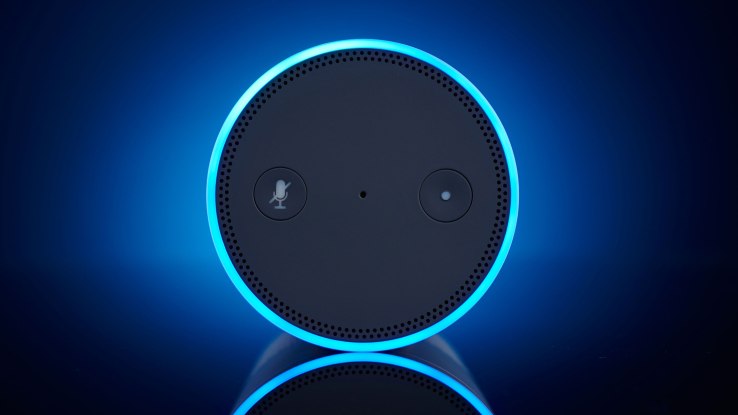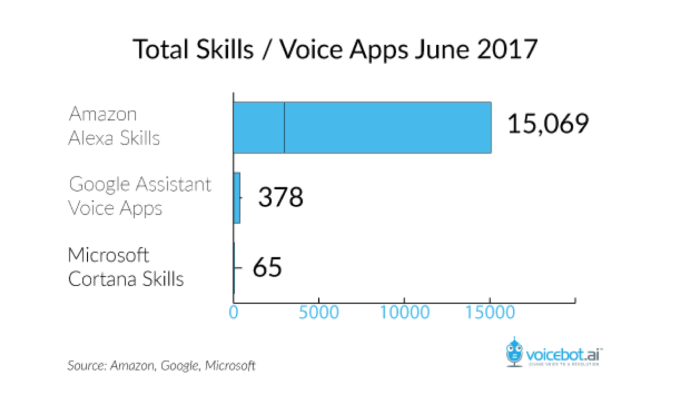

Amazon today announced a new program that gives developers a way to earn money for their Alexa skills – the voice apps that run on smart speakers like the Echo, and other Alexa-powered devices. According to the company, developers will be compensated for top-performing and “engaging” voice apps across over a half-dozen categories, including games, which were previously being compensated through a similar program.
This program had first begun in May, when Amazon quietly introduced direct cash payouts to Alexa developers with popular games.
Now, Amazon will begin to reward voice apps in other categories, including Education & Reference, Food & Drink, Health & Fitness, Lifestyle, Music & Audio, and Productivity, it says.
The idea here is to offer developers a means of making money from their Alexa skills ahead of any formal monetization program. The Alexa App Store today doesn’t let developers charge users for paid voice apps, nor does it allow for in-app purchases. Amazon even changed its policies related to Alexa skill building in order to shut down the first ad network designed for Alexa skills back in June.
That’s left developers to build skills largely as a labor of love – and because they want to be ahead of the game, when Amazon does finally introduce some sort of real business model for generating money from voice applications.

Amazon doesn’t specifically detail in its blog post how it determines what makes an Alexa skill “engaging.” Rather, the company explains that it’s looking for skills that are designed to be “voice-first,” that are unique, that feature fresh content on a regular basis, and those that make life easier for people, as compared with using a search engine.
For example, using a translation skill to figure out how to say something in another language is simpler than having to type the query into a search engine, says Amazon.
In addition, Amazon reiterated that games are some of the most engaging skills on the Alexa platform – likely why they were the first category to receive compensation.
Though Amazon doesn’t provide a full list of metrics or thresholds that developers should pay attention to, one Alexa developer who has been earning rewards for game skills tells us he believes the payouts are largely tied to rankings. The top six skills get payouts from $5,000 for #1 down to about $2,000 for #6, he estimated. Then the next 300 or so get payouts from about $1,000 for #7 down to about $100 for #300.
Alexa developers don’t have all that many numbers to track, at this time. Their dashboards offer metrics for things like sessions, unique users, intents, and utterances (voice commands). But there’s not a direct correlation between any of these and the payouts. That indicates there are other considerations in play that Amazon isn’t disclosing. Amazon confirms to us some of the factors it examines, including minutes of usage, new customers, recurring customers, and customer ratings.
Offering cash for top skills is only one way Amazon has been trying to grow its voice app ecosystem. The company also is doling out Amazon Web Services promotional credits to Alexa developers, so they don’t have to pay for AWS usage charges if skills become popular. Plus, Amazon is running a series of Alexa training workshops around the world, and has been giving developers free Echo devices.

It’s notable that the Alexa platform has managed to attract a sizable group of developers ahead of any formal compensation program, or support for traditional app monetization business models, like freemium apps, paid apps, and advertising. Despite this, Alexa’s app store has grown to over 15,000 skills in a relatively short period of time – after all, the Echo speaker – Amazon’s first Alexa device – wasn’t even available to the public until July 2015.
That said, direct payouts for skills is a program that can only be sustained for so long. Eventually, developers will demand more control over their businesses, rather relying on some inscrutable algorithm. In the meantime, Amazon will face competition from rivals, including Google Home and Apple’s forthcoming HomePod – both from companies who have a better understanding of how an app store ecosystem works.
But those two have arrived late to the game. Alexa has traction, thanks to the popularity of Amazon’s Echo speaker, and now, its affordable little cousin, the Echo Dot, among other newer devices. The company wasn’t first to voice, but it essentially figured out how voice computing should work, to growing consumer appeal.
Instead of a voice assistant running on a phone to be fished out of a pocket or purse, the Echo sits in a single spot in your home. You just speak out loud and the “computer,” Alexa, responds. This is the future sci-fi painted for us long ago, and we already knew how to use it. Now, Amazon needs to prove it can build a sustainable app ecosystem that will allow it to maintain its position in the voice computing landscape; and keeping developers happy is a critical step.
Featured Image: Joby Sessions/T3 Magazine via Getty Images

